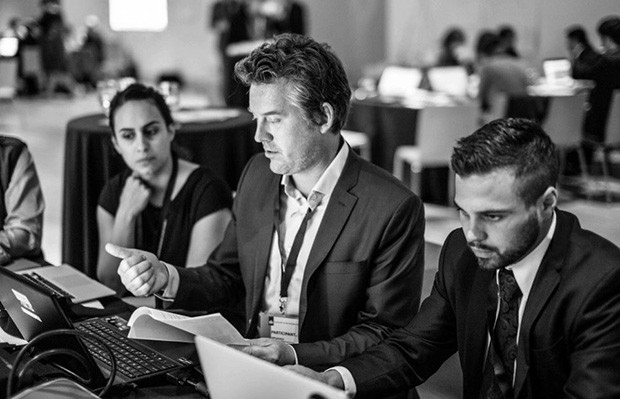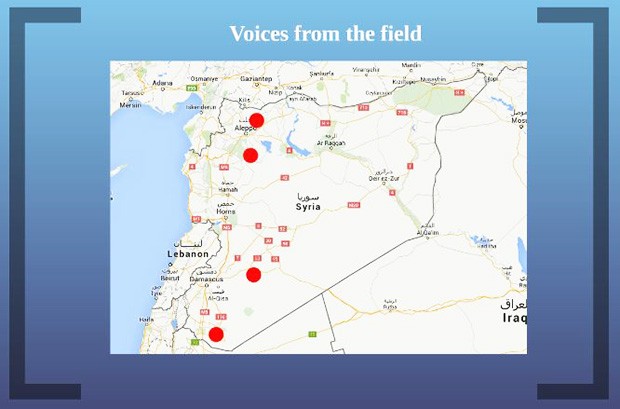How to hack a humanitarian crisis
 Teams were asked to develop a proposal that leveraged web-based technology that could be used to empower citizen-based action. | Images courtesy of Montreal Institute for Genocide and Human Rights Studies
Teams were asked to develop a proposal that leveraged web-based technology that could be used to empower citizen-based action. | Images courtesy of Montreal Institute for Genocide and Human Rights Studies
From the time of the Arab Spring to the ongoing strife in Syria, social media and big data have become increasingly important tools for civilians caught in political conflicts and humanitarian crises.
Concordia's Montreal Institute for Genocide and Human Rights Studies (MIGS) recently sent a team to Canada's first ever #DiploHack Challenge to explore how new technologies can be used to hack through the age-old challenges linked to armed conflict.
The May 27-28 hackathon — hosted in Ottawa by the Embassy of the Kingdom of the Netherlands, the SecDev Foundation and the Canadian International Council, in partnership with the Canadian Department of Foreign Affairs — brought together diplomats, techies, social entrepreneurs, academics and civil society representatives.
Teams were asked to develop a #HackingConfilict proposal that leveraged web-based technology which could be used to empower citizen-based action, in support of one of three “challenge areas” based on UN Resolutions. It was a fast-paced 48 hours of almost non-stop work.
The participants gleaned insight from seven-minute talks given by experts in their respective fields and guidance from group moderators. They then had to pitch their innovation to a group of judges and answer questions regarding their feasibility.
The projects were evaluated on clarity, risk assessment, supporting evidence, feasibility and innovation.
Spearheaded by deputy director Kyle Matthews, Team MIGS comprised a truly multidisciplinary group of human rights experts from across Montreal, including participants from Concordia, Université de Québec à Montréal and Université de Montréal, as well as experts from Montreal’s tech industry.
“The fact that we were approached by the organizers of this event to participate means that word is starting to spread about our work in combating genocidal ideologies online through our Digital Mass Atrocity Prevention Lab,” says Matthews.
 The Chorus digital platform would map out where rapes are happening and provide women in Syria with information on how to practically reduce potential dangers.
The Chorus digital platform would map out where rapes are happening and provide women in Syria with information on how to practically reduce potential dangers.
Hacking sexual violence in Syria
Team MIGS chose to zero in on the use of rape as a weapon of war in Syria. Women and children are ongoing targets in the brutal conflict, and they are in urgent need of external help explains Marie Lamensch, MIGS’s media monitoring manager.
“Most of the sexual violence is happening in areas where the UN isn't present, so the use of technology is one potential solution to stopping rape.”
Part of the research that went into their innovation involved contacting people working on the ground in Syria and finding stats on where sexual violence is taking place, as well as understanding the availability of the internet in the war-ravaged country.
Getting insight from humanitarian aid workers with first-hand knowledge of the conflict was also essential in assessing if their proposal would put the people they were trying to help at risk.
After two days of tireless brainstorming and research, the MIGS team fine-tuned their innovation into a proposed new digital platform called Chorus. It would allow women to report rape online and connect them with medical professionals who could then provide them with important information about obtaining physical and psychological treatment.
The data obtained through Chorus would also be used to help map out where rapes are occurring and provide Syrian women with recommendations on how to avoid potential danger.
Creativity under pressure
For the MIGS participants, this experience was beneficial on several levels. “#DiploHack forces you to be creative in a very short time span,” says MIGS summer intern Nicolai Pogadl.
“Learning how to think this way is essential because humanitarian crises demand swift responses if they are to be dealt with efficiently.”
It was an also an opportunity for the MIGS team to present innovative ideas to some pretty high-ranking officials including Robert Nicholson, Canada's Minister of Foreign Affairs, as well as King Willem-Alexander and Queen Maxima of the Netherlands.
“The feedback we received was very positive,” says Matthews. “There is a sense that this type of project is doable, and there is interest in seeing it developed.”
Find out more about #DiploHack.